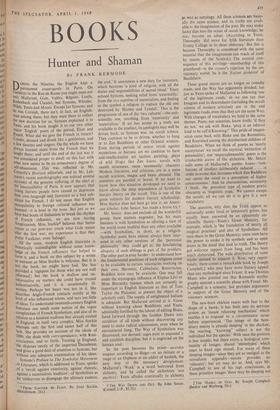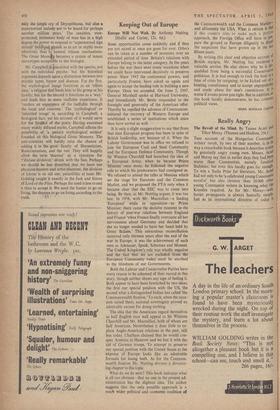BOOKS
Hunter and Shaman
BY FRANK KERMODE Dpermanent avant-garde in Paris. On URING the Nineties the English kept a Tuesdays in the Rue de Rome you might meet not Only Mallarme, Gide, Valery, Regnier, LouYs, Itodenbach and Claude!, but Symons, Whistler, Wilde, Yeats and Moore. Except for Symons, and he Was Cornish, there isn't, in fact, an English- man among them; but they were there to collect the new doctrine for us. Symons explained it to Yeats, and his book taught it to our two other major 'English' poets of the period, Eliot and Pound. What did we give the French in return? Conder, dressed and drunk like a gentleman, and a few dancers and singers. On the whole we have always r learned more from the French than we taught them; and until the end of the last war it Was considered proper to dwell on this fact with what now seems to be an unnecessary degree of self-abasement. This was reflected in Mr. Connolly's Horizon editorials, and in Mr. Leh- nlann's recent autobiography one noticed several accounts of the genuine suffering of the elect at the inaccessibility of Paris. It now appears that "Ling literary people have ceased to deprecate their own language and literature as a bad sub- stitute for French. I do not mean that English susceptibility to foreign cultural influence has lessened—it is bred in the bone. But just as we have had bouts of Italianism to break the rhythm of French influence, we are now having Americanism. Miss Starkie* believes that Sartre means to our post-war youth what Gide meant after the first war; my experience is that they prefer Faulkner, even Salinger.
All the same, modern English literature is historically unintelligible without some know- ledge of the French influences that helped to form it, and a book on this subject by a writer as eminent as Miss Starkie is welcome. But it is not the book we might have had. She has Provided a 'signpost for those who are not well informed'; but the book is shallow and un- informative on matters she could have treated authoritatively, and it is occasionally ill- written. Perhaps her heart was not in it. She describes Anglo-French contacts mostly at the level of who influenced whom, and says too little of ideas. To understand twentieth-century English literature one needs some notion of the vague Complexities of French Symbolism, and also of its relation to a kindred tradition that already existed in England, in itself very complex. Miss Starkie attempts only the first and easier half of this task. She provides an account of the ideals of 1886; she deals with correspondance, with Rosi- crucianism, and so forth. Turning to England, she disposes neatly of the imported Decadence, and gives a good deal of attention to Symons; but without any adequate examination of his ideas.
Symons's Preface to The Symbolist Movement • in Literature, which is addressed to Yeats, speaks of a 'revolt against exteriority, against rhetoric, against a materialistic tradition; of Symbolism as an 'endeavour to disengage the ultimate essence,
(Hutchinson, 21s.) (Cornell U.P., $3.75.)
the soul.' It announces a new duty for literature, which becomes 'a kind of religion, with all the duties and responsibilities of sacred ritual.' Yeats echoed Symons, seeking relief from 'externality,' from the vice supreme of materialism, and finding in the symbol a religion to replace the old one destroyed by 'Huxley and Tyndall.' This is the programme of one of the `two cultures'—the anti- scientific one, revolting from 'exteriority' and 'materialism.' If art has access to a truth not available to the intellect, its apologists may well be driven back, as Symons was, on occult science. They continue to be so driven, whether to Jung or to Zen Buddhism or other Oriental wisdom. Even during periods of minor revolt against mysterious or hieratic art we continue to have anti-intellectualist art (action painting, plays of wild illogic like Zen koans. novels with occult structures, verse 'necessarily' obscure). Modern literature, and criticism, are in a sense occult sciences, mages and beats abound. The scientists are puzzled or bored. If we want to know how this situation developed we need to know about the deep dependence of Symbolist literary theory on the occult. This is one of the great subjects for modern literary scholarship; Miss Starkie does not here go into it; an Ameri- can scholar, John Senior, has made a brave try.t Mr. Senior does not exclude all the wonderful gossip these matters engender, but his main business is with Symbolism as offering a view of the world more truthful than any other available —with Symbolism, in short, as a religion. Symbolist poets have almost always been inter- ested in any other versions of the 'perennial philosophy' they could get at; the bewildering ubiquity of such siblings is part of the problem. The other part is even harder : to understand how the fundamental positions of such religions come to be available to certain visionaries working on their own. Hermetic, Cabbalistic, Rosicrucian, Buddhist texts may be available. One may fall under the mystagogic influence of Eliphas Levi or Mme Blavatsky (names which are certainly as important to English literature as that of Tom Taylor the Platonist, at present the object of a scholarly cult). The supply of enlightened Indians is adequate. But Mallarme arrived at le Neant without knowing about Buddhism; and Yeats, admittedly fortified by the labour of editing Blake, fared forward through the Golden Dawn into occultism of all kinds without discovering any need to make radical adjustments, even when he encountered Jung. The Way of Symbolism was discovered, not devised; sages exist to expound it and establish discipline, but it is engraved on the human soul.
So the poet becomes the priest—sacerdos magnus according to •Hugo—or an initiate or a mage or an Orpheus or an addict of hashish, the easy way to the necessary dereglement. Mallarmes 'Work' is a word borrowed from alchemy, and he called the alchemists 'nos ancetres% Yeats alludes continually to alchemy
as west as astrology. All these sciences are basic- ally the same science; and its truths are avail-
able to the imagination of the poet. He may make lucky dips into the ocean of occult knowledge; he may become an adept. (According to Yeats, Theosophy 'did more for Iri'sh literature than Trinity College in its three centuries.' But this is because Theosophy is concerned with the same material that the imagination. can reach of itself by means of the Symbol.) The normal con- sequence of this privilege—membership of this priesthood—is the voyant's rejection by the un- visionary world; he is the 'Enfant desherite of Baudelaire.
These grand claims are no longer so roundly made, and the Way has apparently divided; but just as Yeats spoke of Mallarmd as following 'one of the legitimate roads,' so we can say that Imagism and its descendants (including the occult science of modern criticism) are in the end legitimate roads, even that they are the same Way. With changes of vocabulary we hold to the same themes. Poets, not scientists, know truth; 'if they do not,' we ask with Blake, 'pray is an inferior kind to be call'd Knowing?' This pride of imagin- ation came back with Blake and the Romantics, and flourished among the disinherited children of Baudelaire. When we think of poems as 'nearly anonymous' we recall the mystical 'extinction of personality'; our 'unparaphraseable' poem is the irreducible (vivre of the alchemist. Mr. Senior calls some of Mallarme's poems koans—'con- fusions of intellect deliberately induced . . . in order to evoke that dizziness which Zen Buddhists say opens the mind to a perception of higher consciousness.' And he characterises, accurately I think, the prevalent type of modern poetic obscurity as 'linguistic yoga.' We cannot escape the occult; all we can do is to give it a new vocabulary.
The question, why does the Truth appear so universally under local or temporary guises, has usually been answered by an apparently un- scientific theory—Yeats's Great Memory, for example, which is 'the foundation of nearly all magical .practices' and also of Symbolism. All men share in the Great Memory; some men have the power to evoke it by symbols and so open doors in the mind that lead to truth. The theory got welcome support from Jung, and has been much elaborated. The wide distribution of some myths seemed to support it. Now, very oppor- tunely, there comes a remarkable book by Joseph Campbell,t who may have more literary appeal than any mythologist since Frazer. It was Thomas Mann who pointed out that Romantic mytho- graphy entered a scientific phase with Freud. Mr. Campbell is a scientist, but provides arguments in support of the Great Memory and of the visionary sciences.
The new-born chicken reacts with fear to the shape of a hawk; it has built into its nervous system an 'innate releasing mechanism' which enables it to respond to a circumstance never before experienced. 'The image of the here- ditary enemy is already sleeping' in the chicken; 'the reacting, "knowing" subject is not the individual but the species.' With man the position is less simple; but there exists a biological com- munity of- images, shared 'stereotypes' which react to fixed sign stimuli. For many of these sleeping images—since they are as vestigial as the vermiform appendix—nature provides no 'releasers'; but art may do so. And, says Mr. Campbell in one of his rapt conclusions, in these primitive images 'there may be sleeping not (Seeker and Warburg, 35s.)
only the jungle cry of Dryopithecus, but also a supernormal melody not to be heard for perhaps another million years.' The sensitive, over- protected, immature body of man has in a high degree the power to respond to 'supernormal sign stimuli' (artifisial,§Amuli as in art or myth) more effectively than to natural release mechanisms. The Great Memcibti becomes a system of innate stereotypes acceptable to the biologist.
Mr. Campbell is koncerned with the species, not with the individual psyche; but his historical argument depends upon a distinction between two psychic types, hunter and shaman. For the first, the mythological image functions as an 'ethnic idea,' a religion that binds him to his group or his family; but for the second it functions as a 'way,' and leads him to some ineffable experience. It 'renders an experience of the ineffable through the local and concrete.' The 'mythological' or 'inherited image' is, according to Campbell, a biological fact; yet his account of it would serve for the Synjbol of the poets. Having examined many widely diffused myths, Campbell affirms the possibility of 'a unitary mythological science' founded on this biological Gneat Memory. The anti-scientists will hardly miss the chance of adding it to the great family of Hermeticism, Rosicrusianism, and the rest. They will happily allow the term 'shaman' as a synonym for l'Ettf ant dclsherite,' drunk with the Sun. Perhaps we should be less disturbed that we have our physicist-hunters and artist-shamans; the division of labour is an old one, palmolithic at least. Mr. Golding caught it exactly in the Jack and Simon of Lord of the Flies. Perhaps the need is less to end it than to accept it. We need the hunter to go on living, the shaman to go on living according to the truth.



































 Previous page
Previous page